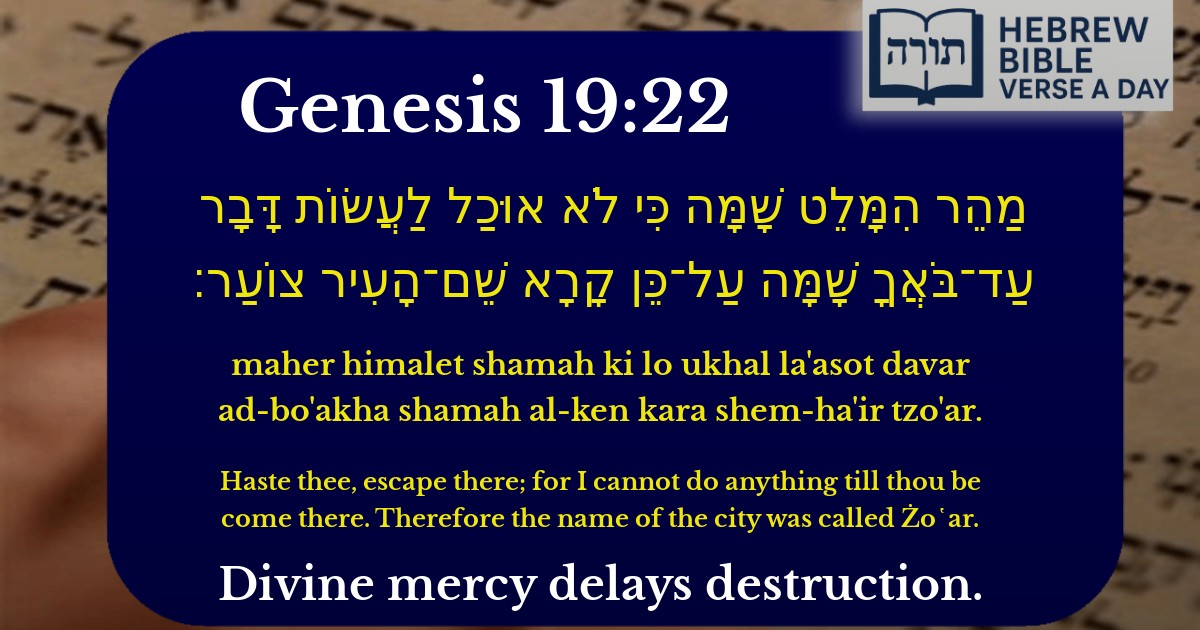Join Our Newsletter To Be Informed When New Videos Are Posted
Join the thousands of fellow Studends who rely on our videos to learn how to read the bible in Hebrew for free!
Hebrew Text
מַהֵר הִמָּלֵט שָׁמָּה כִּי לֹא אוּכַל לַעֲשׂוֹת דָּבָר עַד־בֹּאֲךָ שָׁמָּה עַל־כֵּן קָרָא שֵׁם־הָעִיר צוֹעַר׃
English Translation
Haste thee, escape there; for I cannot do anything till thou be come there. Therefore the name of the city was called Żo῾ar.
Transliteration
Maher himalet shamah ki lo ukhal la'asot davar ad-bo'akha shamah al-ken kara shem-ha'ir tzo'ar.
Hebrew Leining Text
מַהֵר֙ הִמָּלֵ֣ט שָׁ֔מָּה כִּ֣י לֹ֤א אוּכַל֙ לַעֲשׂ֣וֹת דָּבָ֔ר עַד־בֹּאֲךָ֖ שָׁ֑מָּה עַל־כֵּ֛ן קָרָ֥א שֵׁם־הָעִ֖יר צֽוֹעַר׃
מַהֵר֙ הִמָּלֵ֣ט שָׁ֔מָּה כִּ֣י לֹ֤א אוּכַל֙ לַעֲשׂ֣וֹת דָּבָ֔ר עַד־בֹּאֲךָ֖ שָׁ֑מָּה עַל־כֵּ֛ן קָרָ֥א שֵׁם־הָעִ֖יר צֽוֹעַר׃
🎵 Listen to leining
Parasha Commentary
📚 Talmud Citations
This verse is quoted in the Talmud.
📖 Sanhedrin 109a
The verse is referenced in the context of discussing the fate of the city of Zoar and the righteousness of Lot.


Context of the Verse
This verse (Genesis 19:22) is part of the narrative describing the destruction of Sodom and Gomorrah. The angels instruct Lot to flee to the small city of Zoar (צוֹעַר), as they cannot bring about the destruction until he reaches safety. The urgency and divine protection are central themes in this passage.
Rashi's Commentary
Rashi explains that the phrase "כִּי לֹא אוּכַל לַעֲשׂוֹת דָּבָר" ("for I cannot do anything") reflects the principle of divine justice (מִדַּת הַדִּין). The destruction was decreed, but Hashem's mercy delays judgment until the righteous (in this case, Lot) are out of harm's way. Rashi also notes that the city was named צוֹעַר (Zoar), meaning "small," because it was the smallest of the cities in the region, spared due to Lot's merit.
Midrashic Insights
Rambam's Perspective
In Moreh Nevuchim (Guide for the Perplexed 3:50), Rambam discusses the nature of divine intervention in this episode. He emphasizes that Hashem's justice operates with precision—evil is punished only when the righteous are no longer present to be affected. This aligns with the principle of השגחה פרטית (divine providence), where individual merit can influence broader outcomes.
Halachic and Ethical Lessons